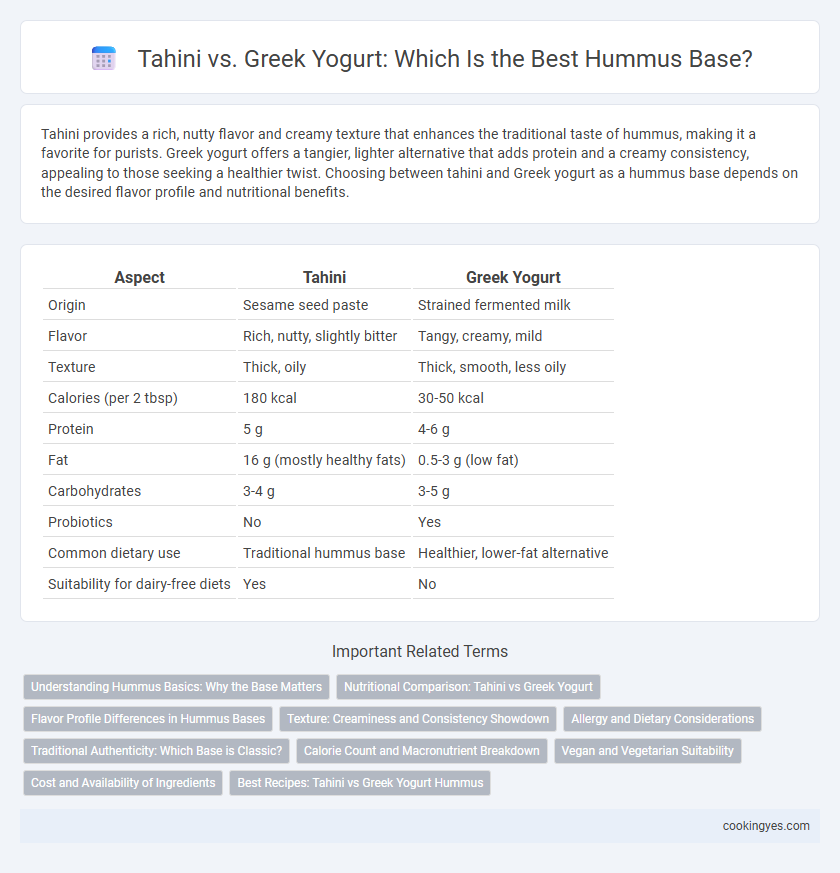Tahini provides a rich, nutty flavor and creamy texture that enhances the traditional taste of hummus, making it a favorite for purists. Greek yogurt offers a tangier, lighter alternative that adds protein and a creamy consistency, appealing to those seeking a healthier twist. Choosing between tahini and Greek yogurt as a hummus base depends on the desired flavor profile and nutritional benefits.
Table of Comparison
| Aspect | Tahini | Greek Yogurt |
|---|---|---|
| Origin | Sesame seed paste | Strained fermented milk |
| Flavor | Rich, nutty, slightly bitter | Tangy, creamy, mild |
| Texture | Thick, oily | Thick, smooth, less oily |
| Calories (per 2 tbsp) | 180 kcal | 30-50 kcal |
| Protein | 5 g | 4-6 g |
| Fat | 16 g (mostly healthy fats) | 0.5-3 g (low fat) |
| Carbohydrates | 3-4 g | 3-5 g |
| Probiotics | No | Yes |
| Common dietary use | Traditional hummus base | Healthier, lower-fat alternative |
| Suitability for dairy-free diets | Yes | No |
Understanding Hummus Basics: Why the Base Matters
Tahini provides a rich, nutty flavor and creamy texture essential for traditional hummus, offering healthy fats and a distinct sesame seed taste. Greek yogurt creates a tangier, lighter hummus with added protein and a smoother consistency but alters the classic profile. Selecting the right base impacts texture, taste, and nutritional balance, highlighting the importance of understanding hummus fundamentals.
Nutritional Comparison: Tahini vs Greek Yogurt
Tahini, made from ground sesame seeds, offers a rich source of healthy fats, protein, and essential minerals like calcium and iron, contributing to heart health and bone strength. Greek yogurt provides a high-protein, low-fat option packed with probiotics, calcium, and vitamin B12, supporting digestion and immune function. Choosing between tahini and Greek yogurt as a hummus base depends on desired nutritional benefits and dietary preferences, with tahini favoring healthy fats and minerals and Greek yogurt emphasizing protein and probiotics.
Flavor Profile Differences in Hummus Bases
Tahini provides a rich, nutty flavor with a creamy texture that enhances the traditional earthiness of hummus, delivering a slightly bitter and toasted sesame seed taste. Greek yogurt introduces a tangy, creamy profile that lightens the hummus, adding a refreshing acidity and smoothness. The choice between tahini and Greek yogurt bases alters the hummus's depth and brightness, appealing to different palate preferences.
Texture: Creaminess and Consistency Showdown
Tahini offers a rich, creamy texture with a slightly oily consistency that enhances traditional hummus by providing a smooth and velvety mouthfeel. Greek yogurt introduces a lighter, tangier creaminess that results in a thicker, more luscious hummus base with added moisture and silkiness. The choice between tahini and Greek yogurt ultimately influences the balance of creaminess and consistency, tailoring hummus to preference.
Allergy and Dietary Considerations
Tahini, made from ground sesame seeds, is a common base in hummus but may trigger allergies in individuals sensitive to sesame. Greek yogurt provides a dairy alternative that adds creaminess and protein, suitable for those avoiding sesame but not for those with lactose intolerance or dairy allergies. Selecting between tahini and Greek yogurt as a hummus base depends on dietary restrictions, allergy concerns, and desired nutritional profiles.
Traditional Authenticity: Which Base is Classic?
Traditional authentic hummus relies on tahini as its classic base, delivering a rich, nutty flavor and creamy texture integral to Middle Eastern cuisine. Greek yogurt, while offering a tangy twist and lighter consistency, is a modern adaptation rather than a traditional component. Authenticity in hummus is defined by the use of tahini combined with chickpeas, olive oil, lemon juice, and garlic.
Calorie Count and Macronutrient Breakdown
Tahini, made from ground sesame seeds, provides a higher calorie count and a rich source of healthy fats, primarily monounsaturated and polyunsaturated fats, contributing to a creamy texture in hummus. Greek yogurt offers a lower calorie option with increased protein content and fewer fats, making it suitable for those seeking a lighter, high-protein alternative. The macronutrient breakdown shows tahini as fat-dominant, while Greek yogurt emphasizes protein, influencing the nutritional profile and texture of the final hummus.
Vegan and Vegetarian Suitability
Tahini serves as a traditional vegan-friendly base for hummus, offering a rich, nutty flavor and creamy texture derived from ground sesame seeds. Greek yogurt provides a tangier, protein-rich alternative suited for vegetarians who consume dairy but not vegans due to its dairy content. Choosing between tahini and Greek yogurt impacts the hummus's nutritional profile, flavor, and alignment with dietary preferences such as veganism and vegetarianism.
Cost and Availability of Ingredients
Tahini offers an authentic, rich flavor for hummus but tends to be more expensive and less widely available than Greek yogurt, especially in local supermarkets. Greek yogurt is a budget-friendly and accessible alternative that provides a creamy texture and tangy taste, making it easier to incorporate into everyday recipes. For cost-conscious cooks, Greek yogurt serves as a practical base without compromising the creamy consistency essential to hummus.
Best Recipes: Tahini vs Greek Yogurt Hummus
Tahini provides a rich, nutty flavor and creamy texture that enhances the traditional hummus experience, making it the best choice for authentic Middle Eastern recipes. Greek yogurt offers a tangy twist and adds protein, ideal for lighter, Mediterranean-inspired hummus variations. Comparing tahini and Greek yogurt bases highlights different nutritional benefits and flavor profiles suited to diverse culinary preferences.
Tahini vs Greek Yogurt for Hummus Base Infographic

 cookingyes.com
cookingyes.com